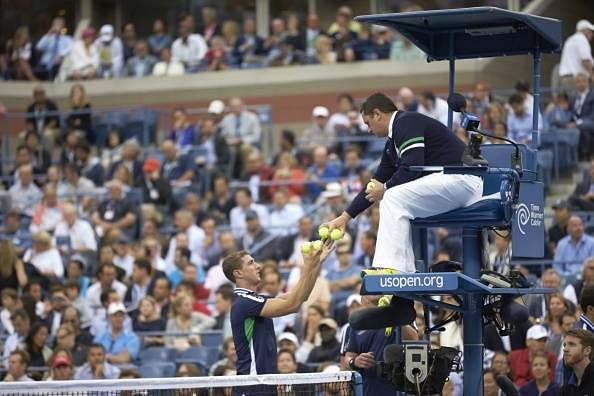
Banned umpire worked at 2015 U.S. Open due to 'flaw'

A Croatian tennis umpire banned from officiating for 12 months after a corruption inquiry worked as a linesman at last year's U.S. Open because of a "flaw in our system", the United States Tennis Association said on Friday.
Denis Pitner was suspended by the International Tennis Federation in August after sending information about a player to a coach during a tournament and regularly logging on to a betting account from which bets were placed on tennis matches.
"We had a flaw in our system. Denis Pitner did work as a linesman at the 2015 U.S. Open," Chris Widmaier, the USTA's managing director of corporate communications, told Reuters on Friday via email.
In a statement, the USTA said: "As we have now determined, Mr. Denis Pitner had been approved to work the U.S. Open as a linesman on July 13. The USTA was notified that Mr. Pitner was placed on the 'Do Not Credential' list on August 24.
"Mr. Pitner had already picked up his credential prior to the USTA being notified. Due to a flaw in our process, which we are investigating now, Mr. Pitner's credential was not canceled.
"The USTA takes this matter extremely seriously and has made the investigation of what caused the error its highest priority, and will work with the newly created independent review panel to ensure instances such as this are not repeated in the future."
Pitner incurred his suspension by the ITF six months after fellow tennis umpire, Kazakhstan's Kirill Parfenov, was banned for life for contacting another official on Facebook in an attempt to manipulate the scoring of matches.
Both umpires were sanctioned for breaches of the sport's code of conduct for officials while four other umpires were also under investigation by the Tennis Integrity Unit (TIU).
However, the ITF did not announce the bans for Pitner and Parfenov until earlier this week, explaining that previously its Code of Conduct did not require officials sanctioned to be named.
Tennis is still reeling from widespread allegations of corruption in the sport and the independent review panel (IRP), which was launched last month, will take at least a year to complete its investigations.
The IRP was established following media reports criticising the TIU for not adequately investigating some 16 players repeatedly flagged over suspicions they had thrown matches in the past decade.
Match-fixing allegations by the BBC and the online BuzzFeed News broke before last month's Australian Open.
The allegations were further fuelled by former Australian professional Nick Lindahl pleading guilty in January to match-fixing in a minor tournament in 2013.
A top global bookmaker also suspended betting on a suspicious match at the Australian Open.